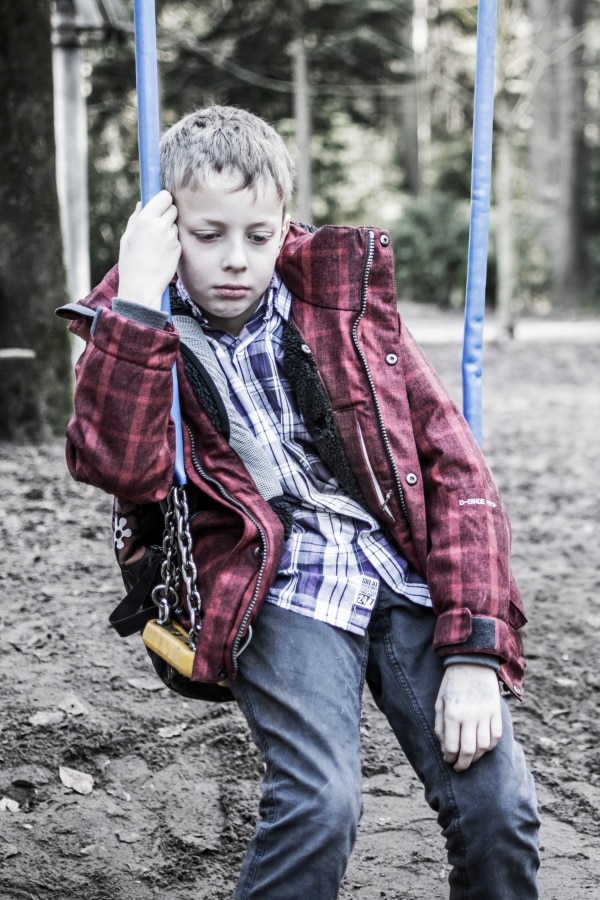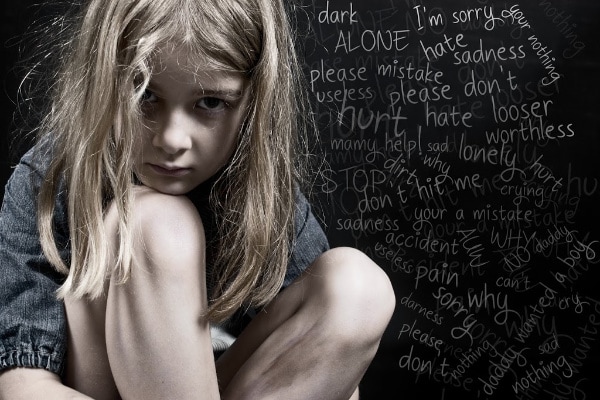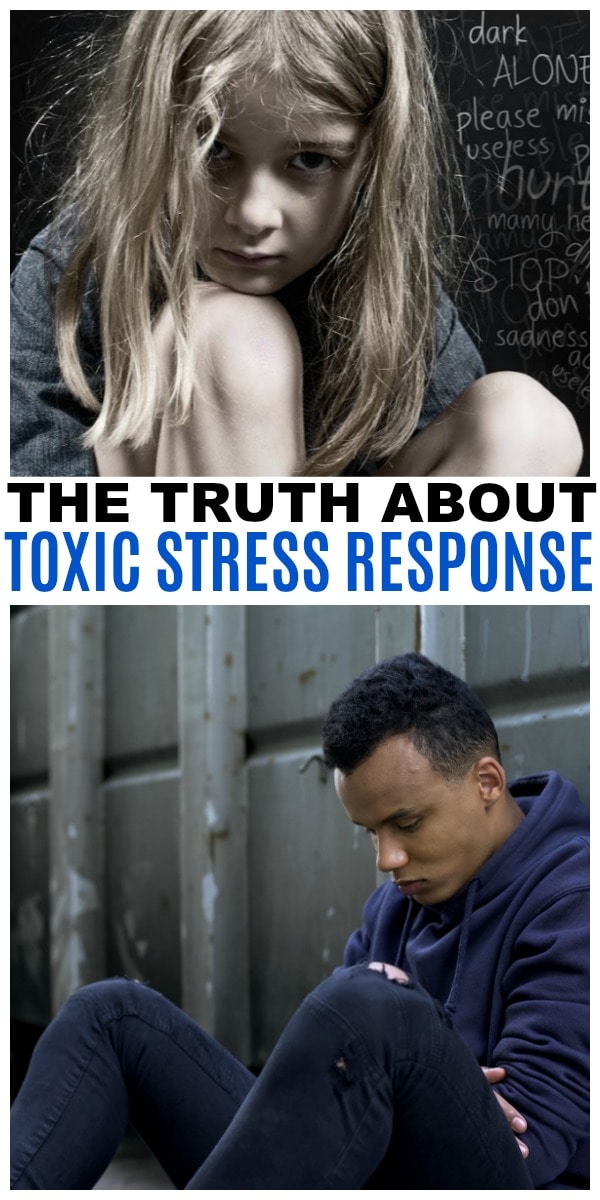This post is made possible with support from the American Academy of Pediatrics through a cooperative agreement with the Centers for Disease Control and Prevention. All opinions are my own.
Stress is all around us, but there is stress and then there is stress; the kind that leads to a toxic stress response, which causes major physical and emotional damage. By knowing the truth about toxic stress response and the role it can play in our lives after a traumatic event, the better we can address this problem. This is especially important when it comes to children.
Table of Contents
I SEE IT EVERY DAY
You know those topics that hit close to home and make a fire burn inside you? Well, the toxic stress response that can occur after an adverse childhood experience is something that I am passionate about addressing.
I have worked as a school nurse for over 18 years, and I have seen the effects of toxic stress on children daily in my health room. Children from all walks of life, all races, all socioeconomic levels have walked through my door exhibiting signs of toxic stress response.
My heart aches for these kids who are in situations totally out of their control. I see children who have chronic, unexplained stomach aches from stress. Kids who come in every day for snacks because they don't get enough food at home. I hear stories and see the pain in their little faces.
These children undergo constant stress in their lives due to poverty or neglect. I know the science behind toxic stress response, and I know this can affect these kids for the rest of their lives.
STRESS
We need to unpack stress itself. I don't know anyone of any age who doesn't have some stress in their life. There is the positive kind that fuels you, and then there is the bad kind… the toxic stress.
Positive stress is something that happens briefly, intermittently, and is usually in response to normal childhood or adult adversities. A positive stress situation, such as getting ready for a big presentation or exam, can actually cause us to work harder and achieve more in the long run.
Long-term stress is a different beast. This kind happens due to serious, long-term adversity.
When severe adversities such as child abuse or neglect occur, the stress for a child can go on and on. These situations can easily lead to a toxic stress response.

TOXIC STRESS RESPONSE
A toxic stress response occurs when a person is subjected to long-term, high-intensity stress and has no support systems in place to help them through the situation.
In children, toxic stress response has severe long-term implications by changing the way the brain forms and functions, increasing the likelihood that they will suffer from chronic disease, economic hardships, and a decreased life expectancy as adults.
The situations that can cause a toxic stress response in children are called adverse childhood experiences, or ACEs.
WHAT ARE ACES?
Adverse childhood experiences are experiences that may be traumatic for children and youth during the first 18 years of their lives. Some examples of ACES are:
- Death of a Parent
- Bullying
- Witnessing Violence in the home or community
- Homelessness
- Neglect
- Child Abuse
- Divorce
- Parents or loved ones being incarcerated
- Poverty

FACTS ABOUT ACES
The bottom line is that ACEs are very common. Many people have had an ACE during their childhood, and you may be surprised by how many have experienced multiple ACEs.
What you may not know is that, without the proper support, this early adversity has lasting impacts on the person's long-term well-being. Because there can be biological consequences to ACEs, what happens in childhood does NOT necessarily stay in childhood!
The good news is that what happens during childhood does not have to dictate the future. This adversity does not decide our destiny.
WE CAN ALL MAKE A DIFFERENCE
Topics such as ACEs and toxic stress response can feel very overwhelming, but each and every person has a role to play when it comes to addressing ACEs in our own communities.
There are things we can all do to help prevent ACEs from happening in the first place, and things we can do to help those already affected by them.
I have been working to prevent ACEs for many years as a school nurse––way before I had even heard the terminology.
SAFE, STABLE NURTURING RELATIONSHIPS ARE KEY
One of the most important ways to prevent or mitigate ACEs and the toxic stress response is for people to have access to SAFE, STABLE and NURTURING relationships and environments.
It would be wonderful if every child had a two-parent household that was safe, stable, and nurturing. We know this isn't always the case.
Luckily, these important relationships can be found outside of the immediate home. YOU could be the person to provide a key relationship to someone experiencing ACEs.
Mentors, friends, teachers, pastors, community leaders and more can form critical relationships with children who are experiencing ACEs or who are at high risk to experience ACEs.
Safe, stable, nurturing relationships are the best way to turn a toxic stress situation into a tolerable stress situation. We know from personal experience that if we have someone we can turn to for support during hard times, it makes a big difference.
What if every person in our country had three people they knew they could turn to no matter what? I don't want that to just be a dream; I want to see this become a reality.
The first thing we all need to do is be able to name OUR own three. Who can you turn to personally? Is it a friend, a relative, a coworker?
The next thing we need to do is be aware that there are people who may not have three people in their lives they can turn to. We need to start REACHING out to others.
Let people we come in contact with know that we are AVAILABLE to lend a listening ear. We can BECOME that safe, stable, nurturing relationship for others in our communities.
A TURNING POINT FOR ONE GIRL
I remember a specific student in a school I worked at who came to see me almost daily. This student quickly became what many staff referred to as a “frequent flyer” in the health room.
It didn't take me long to recognize that she had a LOT going on at home. It was a family in turmoil. The child did not have safe, stable, nurturing relationships at home and needed SOMEONE she could turn to. I was able to provide a safe place for her to go.
It took some time to develop trust, but eventually, she recognized that I was available and that I cared. I was able to work with the family and help them get some extra community support.
The turning point for this student was finding her “three.” She started with me, and I helped connect her with others in our building who would go on to develop important relationships with her.
It wasn't hard to make a difference. All it took was showing I cared and being consistent. I know in my heart that by providing a safe, stable, nurturing relationship for this student, the lasting effects of the toxic stress response were decreased in her life.
GET STARTED NOW
Let's encourage other people to find and name their three! I was one of that student’s “three,” and my three are my husband, my parents, and my pastor.
I would love to hear who your “three” are. Let me know in a comment or on social media. Let's NAME OUR THREE! Be sure to use the hashtag #findyour3 if you post yours on social media.
I know that we can all take a step together to start limiting ACEs and preventing the toxic stress response!
Interested to learn more about ACEs? Hop to another post at Life in Pumps, World in Four Days, Sili Recio, Let's Talk Kids Health, or Boston Mamas.
- Homemade Baked Nacho Cheese Chips (Healthy) - April 29, 2024
- Easy Delicious Cajun Ham and Beans Slow Cooker Recipe - April 22, 2024
- Free Printable Graduation Coloring Pages for Kids - April 22, 2024
What a wonderfully explained post on ACEs. It is so important for children to have a soft place to land. I am so glad you were able to be that for so many that walked through your door. You will forever be in their hearts.
Thanks Becky!
Thank you for explaining one of the ACEs so clearly! I have some knowledge of them due to my own childhood and my children as well … but never had it clearly explained so well! Definitely a topic that I will be learning more about so that I can help others as well!
I love this! Thank you very much for helping us regarding stress. Sometimes family matters carry kids to stress and its become very hard to back them into normal life.